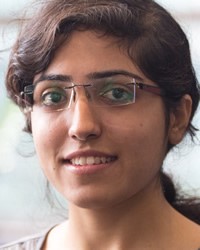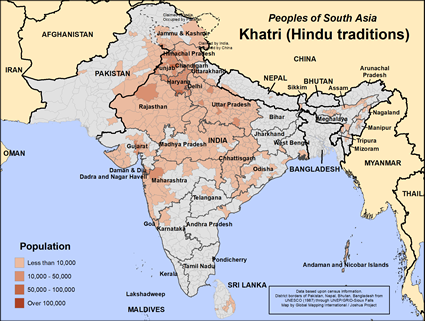Khatri (Hindu traditions) in India

Photo Source:
VGrigas - Wikimedia
Creative Commons
|

Map Source:
People Group data: Omid. Map geography: UNESCO / GMI. Map Design: Joshua Project.
|
| People Name: | Khatri (Hindu traditions) |
| Country: | India |
| 10/40 Window: | Yes |
| Population: | 2,374,000 |
| World Population: | 2,389,000 |
| Primary Language: | Hindi |
| Primary Religion: | Hinduism |
| Christian Adherents: | 0.01 % |
| Evangelicals: | 0.00 % |
| Scripture: | Complete Bible |
| Ministry Resources: | Yes |
| Jesus Film: | Yes |
| Audio Recordings: | Yes |
| People Cluster: | South Asia Forward Caste - other |
| Affinity Bloc: | South Asian Peoples |
| Progress Level: |
|
Introduction / History
Khatri people came from Punjab, a region that straddles eastern Pakistan and northwestern India. They are from the business community, which makes them the third of the four Hindu caste blocks, though some claim to be from the second-tiered Rajputs.
Where Are they Located?
In addition to Punjab, they live mainly in Delhi, Uttar Pradesh, Madhya Pradesh, Himachal Pradesh, Chandigarh, Gujarat, Haryana, Jammu and Kashmir, Maharashtra and Rajasthan.
What Are Their Lives Like?
In addition to being traders, some of Khatri people are financiers and moneylenders. Some have small shops and others are industrialists. Some are agriculturists and breed animals. Others are transporters and contractors, and a few do government work. Khatri in Gujarat print and dye cloth and in Maharashtra they weave silk saris. Some Khatri people are police, doctors, and scientists. They have much influence in northwest India.
Khatri people choose marriage partners within the group. Marriages are arranged by the parents and the elders. They favor adult marriages. Khatri men are only allowed one wife. They dislike divorce, but it is allowed in certain cases such as not being able to have children. Khatris have councils who judge on marriage, divorce and property issues. They use modern and traditional medicine. Divorcees and the bereaved can marry again. In some states such as Bihar though, widows may not re-marry. There are some extended families, but young couples prefer to not live in the homes of their parents and in-laws. They use modern and local medicine and do family planning. Only the sons have property inheritance. It is equally divided and the oldest son becomes head
of the family upon the father's death.
Khatri women do the housework and are involved in social and religious matters. Sometimes they help earn money for the family.
Most Khatris speak Hindi and some can speak English. Many Bible resources are published in Hindi and English, but not necessarily available to people groups in remote parts of northern India.
What Are Their Beliefs?
Khatri are mainly Hindu. They worship all the Hindu gods. They also worship their ancestors. Their main festivals are the same ones that are celebrated by the other Hindus. Brahmin priests do the rituals that relate to births, marriages and deaths. The deceased are cremated and the ashes are immersed in a river with the River Ganges at Haridwar being the favorite. Young children are buried.
What Are Their Needs?
Khatri people need to be liberated from traditions that hinder receiving the Savior who died in their place, and to receive new believers into their traditional community.
Audio, visual, and written Christian resources have been produced in Hindi and English; someone must earn the trust of these people to introduce them to this help.
Prayer Points
Pray that Khatri people will be liberated by God's Holy Spirit from the many ties that bind them, and false dieties that weigh them down, causing them to live in fear.
Pray that as they celebrate many Hindu festivals, the Holy Spirit of the one true God will enable them to celebrate His reconciliation and hope.
Pray for the Lord to multiply the reception and influence of His Word among the Khatris, leading them to love Him with their whole being.
Pray for the Holy Spirit to anoint Khatri families, especially the children and youth, and to raise up a new generation of fruitful, multiplying witnesses of Christ's mercy and love.